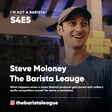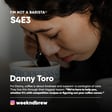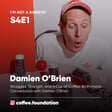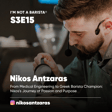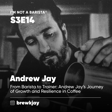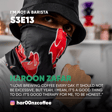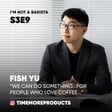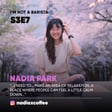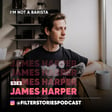Podcast Introduction and Guest Introduction
00:00:06
Speaker
Welcome to the I'm Not A Barista podcast. We're here to talk about all things coffee from industry careers, brewing tips, community support and more with some really incredible people who love coffee as much as you do. We hope their stories inspire you because humanity runs on coffee and together we can empower all the people behind every cup.
00:00:30
Speaker
Hello, guys. Welcome to Amna Barista podcast. I'm your host, Miki. And today we have a special guest who is the first water sommelier in Australia. His name is Derek Meejin. And in this episode, we'll talk about Darren's coffee journey and his love for all things water related and how he got into the water industry.
00:00:50
Speaker
Darren shared with us the importance of understanding the role of water in coffee and how it can greatly impact the taste and quality of the final cup.
The Role of Water in Coffee Quality
00:00:59
Speaker
We also talked about how different types of water can affect coffee and what factors you consider when you're choosing the right water for your brewing and daily hydration. Whether you're a seasoned coffee lover or a professional barista, this episode is the one you don't want to miss.
00:01:17
Speaker
Dary, welcome to Amnao Barista podcast. I have known you for a while. You were a volunteer writer. And I'm Amnao Barista for a while. And you are also the first Australian water sommelier. That's sommelier. That's sommelier. Anywhere you're from.
00:01:38
Speaker
Yeah, sommelier. If you say like French or British or Italian-American, it doesn't matter. It's the same thing. Yeah, sommelier. Yeah. Sommelier. All right. So, Darren, first, before we talk about water or coffee, please tell us about who you are. What do you do for a living?
00:01:57
Speaker
Perfect, coffee, I'm now working for a green bean importing company, especially using Brazilian coffee. I'm basically selling green bean coffee to coffee roasters and connecting with their producers in Brazil and learning what I can with
00:02:19
Speaker
Portuguese at the same time and helping connect the roasters with the producers and getting people out there with these great coffees. So that's what I'm basically doing, going around and drinking coffee and getting people to taste coffee.
00:02:37
Speaker
It's a great way to connect. You get to see both sides of the story. You see the customers enjoy the coffee from the cafes and roasteries. And yet you also talk to the producers every week as well. And you've got that link in the middle where I've got that opportunity to share those stories. And I think that's the important part of what I really enjoy. I get to share the stories direct to where they go. That's beautiful.
00:03:01
Speaker
All right, so today, most important thing, let's talk about water. I know that it could be a big topic, right? Depending on who you ask. How did you get started? How did you get into
Darren Meejin's Passion for Water and Coffee
00:03:12
Speaker
this? It can be a big topic or some people just think, oh, it's just water, it's just water. Yeah. So that's a topic that can be. Water for me is like I fell into my water studies because I wanted to make a better coffee. But then
00:03:27
Speaker
I move further down the line as in like, well, instead of it just coffee, what is water by itself? And then I experimented with cooking to start out with cooking, like making pasta with different waters. And I wonder why my pasta tastes different because I use different waters when I was making it.
00:03:45
Speaker
So when you're meeting and then it just became all because that mineral is this and that the composition is different. So this is where my I got interested in what I was getting at with different waters. And then I was sitting down during a during our lockdown periods and I was still working, but I had a lot more opportunities to because I couldn't travel as much to learn some new things.
00:04:10
Speaker
and I bumped across this water similiar on a Netflix episode and I sent him a message asking about what do you do like direct messaging and oh I've got a water similiar school and you hooked me all up there and I did some training with him and then nine months later I completed my water similiar certification.
00:04:30
Speaker
as the first one in Australia, which was freaking crazy. I didn't expect that when I first started the journey. For me, it was just making a better coffee, and now I've learned more about water, and now I understand my coffee better because of the water as well.
Pairing Water with Coffee: Enhancing Flavors
00:04:50
Speaker
But it's different to you find in
00:04:53
Speaker
Other coffee people who love water, they always talk about how to brew with the water. My way of looking at it is how to pair the water with the coffee. So you have a nice coffee you already want from a cafe. You can't control what water they use in their brewing, but you can sort of control what you're drinking next to that coffee.
00:05:16
Speaker
It's like pairing a wine or with a piece of food or like the sweet and sour things and you're getting on certain foods and the balance and the contrast. So you're drinking a glass of, well, you have a coffee, then you have a water with a different type of mineral compared to another water with a different mineral. You're going to have that different flavors in the coffee because of the way the water prepares your mouth.
00:05:44
Speaker
So water is a big topic. Yeah. But for most of us, we don't know much about water. Maybe we know still water, sparkling water, purified water, minimum water. That's it. I think many people ask, how do you make money during? And as a water summary, what is your job description and who do you work for?
00:06:05
Speaker
Well, actually, I'm not using it as a job at the moment. I'm still building up experiences with it and learning with it. The job that comes with it is a responsibility to educate people that water has flavor. Other sommeliers around the world, there's probably only about 100 in the whole world. Other sommeliers, they do consultancy for restaurants. They set up water menus.
00:06:31
Speaker
for restaurants to offer their customers. If they're spending money on a meal and wine, the right water will elevate those flavours that the chef and the winemaker have already prepared. So, pairing them together. A lot of water simile is just your training and education, as in helping people understand different, why it's different.
00:06:55
Speaker
and things like that. I won't go into it at the moment, but why they're different is, that's just part of the things I'm doing at the moment. Like I do, right now I'm doing water tasting sessions, probably about twice a month, where people come and taste 10 different waters side by side. They walk into the tasting sessions and they say, oh, water is just water. Okay, fine. You believe that.
00:07:16
Speaker
They walk out with their mind blown, and they're sending me pictures of all the different waters they're buying from the supermarkets and stuff like that. Just to have someone think about it, for me, is a success. I get a happy face once they pick up the bottle, and they're, oh, it's got all these minerals in it now. They understand, because it's got the label on it, it means something different to something without a label.
00:07:39
Speaker
like the transparency of the branding and what they're doing. It's just sharing those stories about water. It's just like a coffee farmer sharing the stories about his terroir of his coffee, why his coffee is what it is, the processing method. Like every coffee farmer has a story.
00:07:58
Speaker
every bottle of water from a natural source has a story. It's exactly the same. And it's just getting those stories out there. It's like what we do, get our stories out there and share the stories so people can learn from them.
Water Industry Trends and Global Sommelier Distribution
00:08:10
Speaker
And that's probably one of the biggest outtakes I do at the moment is sharing these stories with education on the mineral water side of things. It will get bigger as a
00:08:21
Speaker
Not at the moment, but it'll get bigger, but it's just more awareness. Drinking water has become more popular, more health and wellbeing at the moment. I know in Australia, alcohol drinking has dropped by about 4% in the last two years. And Australia itself is the second highest consumer of bottled water per capita in the world. So there's a market in the whole world to understand about water.
00:08:49
Speaker
That's what it really is. Yeah. Can we call it a trend? Because I really didn't hear much about the water thing and start maybe a couple of years ago, I saw this Netflix show about water called Martin Reins, a German guy in America.
00:09:06
Speaker
He's my teacher. He's my teacher. Really? Well, so. Yeah, he's my teacher. How many people are doing this? Are certificated like water similarities in the world so far? You are the first one in Australia, right? How many are there now?
00:09:25
Speaker
On the first one in Australia, most of them are based, they're all scattered around the world, but you have one in Brazil, a couple in probably four or five in the US. I think there's one in China, a couple in Taiwan, Hong Kong. Korea has quite a few in South Korea, but most of them are in Europe.
00:09:45
Speaker
Europe and there's a couple in South Africa. So they're all scattered around the world and they all sort of want to do the same thing as what I'm doing, as in sharing the stories. It's a trend for people who are not really exposed to say Michelin star restaurants and fine dining places because they've always had access to top quality water.
00:10:11
Speaker
It's sort of within the coffee scene. It's not a big deal because the people are focusing on the coffee It's the it's the coffee has always been the hero and no one's ever made a second thought about the water And what it does next to your coffee, which I know For barista championships if you use a different water next to your arm your coffee when you're serving that it's gonna change how the judge scores yours because you're preparing a judges palette and
Water's Impact on Taste in Food and Beverages
00:10:40
Speaker
based on the water you're sitting next to them. But it's not something people think about, but yet it's done in people think about what water they're drinking when they're judging wine for wine competitions. They always have to have a certain type of water with minerality, so it'll change it. It doesn't affect. It's quite neutral, but then we don't think about that for coffee. A lot of chefs
00:11:04
Speaker
in the kitchens and don't talk to their head baristas. So they're serving a beautiful coffee and have a beautiful meal and they both don't work together in the mouth. Like you have the nice balsamic salad dressing with avocados and you stick that next to a flat white, which is the not going to work together because you've got the acidic types of dressings going with the dairy. So it just doesn't work together on certain types of, but yeah, in the cafe, we just accept it.
00:11:34
Speaker
So, it's just sort of getting people to look at it as it's not just for a high society or Michelin star restaurants and fine dining places. Everyone should have access to options of water. We have options of coffee. Yeah. Right. So, according to your experience or your opinion, where we are right now, you guys are working hard to raise the awareness of water, right? What is real, natural, good water?
00:12:03
Speaker
But where we are right now, how far are we? How far are we? You could say we're a long way away from where we need to be. But we're also a long way forward because there's no, the barriers are not there. The barriers, it all comes down to because what is something everyone drinks?
00:12:25
Speaker
It's not like, oh, I can't drink that. It's not like alcohol or coffee or, oh, after a certain time I need a decaf. As soon as you put it in front of someone, here's the water and they'll go, oh, what's this? Oh, it's water. They're blown away. It's like absolutely blown away because they're drinking something they didn't know. There's three, probably you could say three or four different types of people that
00:12:52
Speaker
a really interesting that would drink water. You've got the people who come in and believe water is just water.
Understanding Water Types and Their Effects
00:12:58
Speaker
You're not going to change my mind. And then they're blown apart because all of a sudden you've just shown two different waters like I had just here. One is a TDS of a minerality of about 60 from a glacier. So it's actually quite fresh, clean. And one is a TDS of 1,300.
00:13:18
Speaker
water, and that's just from an arty—so it's come out of the ground all by itself, so that has a lot more minerals in it. It's going to taste different to one that's come from an ice glacier in Iceland. They're going to change the way you feel, and you put them in front of people, and it just blows their head apart. That's sort of what you're going to get with people.
00:13:41
Speaker
Yeah, there's barriers out there. I'm not paying that. But then once they realize it's different, it's like coffee, a geisha, and having just something spent, a regular coffee. So it's sort of put it like that way in coffee. There's a special coffee, and then there's an everyday coffee. It's the same with water. So we have a new thing called special water now. We have wine tasting, coffee tasting, and now we have the new trend. It's got water tasting.
00:14:11
Speaker
Yeah, well, right now happening in Athens, there's a World Fine Water Awards. It's where they're judging the best waters of the world happening every year they do that. And it's like a cup of excellence, but it's for water. The water's entering the different categories and they get their awards. And that's done every year. And that's done with about 75 people in Athens right now, today and yet tomorrow.
00:14:38
Speaker
And that happens every year. There's judging awards through the Fine Water Academy and the Fine Water Society. It's a real thing, yeah. Yeah, it's a completely new industry, like new, whole new world after knowing, especially coffee, now we have a special water world you need to study. It's really, really interesting. But they're still integrated.
00:14:59
Speaker
They're so integrated there, Mickey. It's like so integrated how a cafe, like so many good cafes now have got good menus and good foods and people spend money on like $25 or $35 cups of coffee. But then they want to have the tap water that they give them.
00:15:15
Speaker
And then that type of water being stripped of all minerals so it's basically purified water with nothing and you drink that it's dry on your mouth after there is no aftertaste and got that sharpness at the end and then you're putting a twenty five dollar geisha in there so how's that gonna work when you've got nothing on your palate.
00:15:35
Speaker
Right. Yeah. It's for me, it's like, OK, I go to a coffee shop and order some food and I expect some nice water. But of course, I don't want to pay too much because I think I get used to free water every day. Right. We can get purified water or tap water. They are very cheap and we just.
00:15:55
Speaker
We just drank it. But what do you think in the future will be like if more people know water better, just like you? Would you think water will become more expensive? Well, I don't know about more expensive. I think it's already, in Australia, it's probably the second most expensive country in the world for bottled water. But it's like behind Singapore.
00:16:21
Speaker
Water itself, yes, it will get more expensive. In the future, there'll be more options for people. Instead of just being given, here's your water when you sit down. Oh, would you like our complimentary water or would you like to have a look at something on our water menu that works well? I think that is where the specialty places would go to. It's an extra revenue stream for them. It doesn't cost them any money to do it because they can just take a box of water in the fridge, that's it. Then all they've got to do is educate their customers.
00:16:49
Speaker
Here's our complimentary water. You're welcome to try that. But if you want to have a different experience with your mouth feel paired together, you can try one of these waters we're offering that works well for that. And they pay their $4 for that extra experience or something, $4 or $5 or something. And it's something that people will do if they're offered it. But they've got the choice to say no if you give them the option.
00:17:11
Speaker
So you have four or five coffees. There's a lot of coffees there as an option on cafes around the world now. You have more than one. You don't just get a one coffee choice. And that's where I want a water option.
Choosing Water for Hospitality and Daily Use
00:17:25
Speaker
And I think where we are now, I think 2023, we don't have options for water.
00:17:33
Speaker
where we should be having options for water because it's the most important beverage the human needs. But then we have options for bubble tea or the options for everything else, but not water. Yeah, water is water, right? That's what most people think. But like you said, water is just a whole big world there. So many kinds of water. So what kind of water do you recommend us or regular people to drink?
00:17:57
Speaker
There are different types of water, like for hydration purposes. Like I drink about six or seven different types of water a day, depending on my mood, the weather, what activities I'm doing, because each water does things different for your body based on what you're doing.
00:18:13
Speaker
So if you want to use the marketing buzzwords, they use called electrolytes. Electrolytes are the same thing as TDS. So your minerality is electrolytes. So a Gatorade basically doesn't have many... A tap water you have will probably have more electrolytes than a Gatorade because it hasn't got the sugar in it. It's probably better for you. It's going to get you better depending on where your tap water is from around the world. But in general,
00:18:40
Speaker
say something like an Evian is probably an everyday one to drink, or something similar around that middle of the range water that you can easily access. I think in the whole world, you can pull out these Evians, the Fijis, those brands. It doesn't actually need a certain brand, but as long as it says on there, natural mineral water and not purified water, that's okay. Okay, no purified water. Purified water is tap water. Yeah.
00:19:09
Speaker
That water. Yeah. And we shouldn't be paying money to tap water. Yeah. It's tap water. There's nothing wrong with tap water, but you shouldn't pay money for it. They should be given to you. And if you're buying a bottle of tap water, but what do they just give it to you? A lot of people out there, they don't even have access to clean drinking water.
00:19:26
Speaker
So tap water is an important thing to have. There's nothing wrong with tap water. It's not a bottled water sommelier. It's a water sommelier in general. So it's not saying bottled water you must have. Tap water around the world is very interesting. There's nice places to have tap water. And you shouldn't be paying money for it. That's my big point about it. It's like if they offer to tap water, just take the tap water. But you just need an option out there.
00:19:54
Speaker
to look at something. But next time, if you go to coffee shop, remember, if they don't have water option, we better buy our own water. If you order some expensive coffee there, right? I always do. I always have a bottle of water with me. Always. Yeah. I always take a bottle of water with me. Yeah. And I posted on there, I do a little food pairing at the cafes and I've got a couple of cafes now in Brisbane that actually now stock.
00:20:18
Speaker
certain waters that i've been to around because they've seen the things i've done and i've done some tastings with the cafe owners and they offer a a bottle of water they have one or two options now on their cafe menu but they still have their regular tap water they offer their customers so it's a slow integration i think it just comes down to the education piece um it's like okay
Educational Journey of Water and Coffee
00:20:41
Speaker
Where water is, I think, is behind where coffee is in that journey. Because people already expect, in the specialty coffee, people expect information with their coffee. They want to know where it's from. They want to know that information. Already they do. But water's behind that journey, but it's going on the same path. So that's how I look at it.
00:21:03
Speaker
And quite a lot of these water brands, like really good water brands, they're family businesses. It's like a coffee farm. It's owned by a family, for example. Icelandic's another family business. A lot of them are family businesses, not multinational companies, like the big brands out there. So the family businesses are the ones that's doing the right thing. All right. Very, very, very interesting topic. Yeah.
00:21:33
Speaker
Before the chat, I did some research and bought some special water for tea, for pouring tea. And it's three times as regular mineral water. And therefore, not a province in China, because now I'm in China. And it's probably somewhere in the middle of China. It costs like, I don't know, hundreds of thousand kilometers from here.
00:21:56
Speaker
I can taste a little bit different, like, because I drink coffee, you know, the body is more, it has more body, more smooth. It will taste different. And it has more mineral, according to the label. But I never could imagine that I'm drinking water from somewhere so far away. I thought water is always local resource, right? Someone company, yeah, purified water and get it ready for you to drink. That's it. It's insane.
00:22:24
Speaker
It literally is insane. We drink wine from around the world. We drink coffee from around the world. I've been to many tea farms like when I was living in Japan. Everywhere you have access to anything. The world is not one. The world's connected so much now that we have access to so many options. And while we have the access to that, maybe people couldn't in the past, we have access to this. We should explore it.
00:22:49
Speaker
Yeah, and you'll find out when you're having your tea as well to certain waters, it'll change because tea has got a certain way it sits on your tongue and then a water next to your tea will really, really change that too. One big thing I noticed with people who love to drink red wine,
00:23:07
Speaker
If you have a very high mineral still water, like I've got here, the Three Bays water from Victoria, Australia, this one's actually creamy, this water. So it literally tastes like a, it's very creamy, like a custardy, it's got a very yogurty type of creaminess, but it's super sweet. And it's just, it's water from Victoria, Victoria. It's just got 25 different minerals in it. And it's beautiful. And if you have that,
00:23:34
Speaker
next to a red wine, it's going to control those tannins of the wine. And all of a sudden, they're going to elevate all the other delicate aromas and flavors that the wine maker wanted you to get because the minerals control the tannins. It's just amazing when you get someone next to them. Oh, wow. And I do the same with the coffees. I think after this episode, I would definitely cook very expensive meal with mineral water. I would taste how pasta tastes differently.
00:24:02
Speaker
Well, with the past, there is another good example that Martin Risse, my teacher keeps telling me about, is New York bagels.
Water's Unique Effects on Food and Drink
00:24:09
Speaker
The best New York bagels are always made in New York. And the bagels around the world often, the people who make them, get the recipe of the New York water. So they can use a New York type of water in their bagels. So it tastes like a New York bagel. Because the fluffiness and everything, because the water in New York is very good for baking.
00:24:30
Speaker
compared to, say, LA or, I don't know, in Brisbane, Australia, the water is all very different. And if you want to make a New York bagel here, it's not going to taste like a New York bagel. Because the water, I mean, it makes a big difference on how, when it rises in the oven and cooking, and let's just, why the minerals react to the heat as well. I've been to wine tasting, coffee tasting, but I've never been to water tasting. Tell me more about it. What's happening?
00:24:59
Speaker
at the water tasting event. A water tasting event that I'm hosting is I'm presenting still mineral waters based on minerality, say from your super low category, which is from a TDS with total dissolved solids of say 50 and below, all the way up to your super high, which is up to 1,300. And you taste them all side by side.
00:25:26
Speaker
and you understand the journey of how the minerals and the source change on the tongue because you're doing it side by side.
00:25:35
Speaker
So that's, um, yeah, that's that journey that you're on that. So, and then all of a sudden you're, wow. And people come back to all really how different it is. And it's just interesting to see the reactions of those journeys for a water tasting, um, side by side. And that's only for the still mineral waters. Sparkling is a different story altogether. And that blows people's heads apart when you give them different sparkling waters. So how many, how many kinds of water do you normally offer?
00:26:03
Speaker
Um, five still and five sparkling. So about 10 different types. Um, but not full cups. You just have a little bit of each cup. Cause otherwise you've got to run to the toilet all the time. It's like, yeah. Yeah. So about 10, 10 waters. Um, and you do a tasting journey. Like a wine flight.
00:26:22
Speaker
Between one hour to one and a half hours, it's not too long. Depending on how the group are reacting to it, the type of questions you get, they're only in small tasting groups of about 10 people. So you have the intimacy where you can actually talk about it because I believe it seems to be small because it's an experience that the people have never had before. And they want to ask questions, they want to talk.
00:26:48
Speaker
I'm gonna have that intimacy at the smaller groups on you have the access to ask the questions you want to ask because you've never ever done a water tasting.
00:26:57
Speaker
I'm sure you've only got one glass of water next to you, not three. So it's sort of, it's, people don't ever experience that. So it just have that connection where they can ask these questions they want. Um, and the different types of people that I've had coming to these tasting sessions are amazing.
Water Tasting Events and Personal Preferences
00:27:14
Speaker
It started out because of my connection with coffee. A lot of coffee people are coming, which is amazing.
00:27:19
Speaker
But then they talk to their friends and talk to their friends i still get a lot of coffee people coming but then i'm now getting personal trainers are doctors nurses i'm a veterinarian is all type of people who want to come just to learn more about the water.
00:27:36
Speaker
have like the water for a sparkling. People don't even understand how you can come out of the ground with bubbles. So it's sparkling water and it's already got bubbles in it as it's come out of the ground. It just blows people ahead of part that they can taste the difference compared to one that's been carbonated. They think everything's carbonated.
00:27:58
Speaker
No, this comes out of nature. Mother Nature puts bubbles in it through the geological activity and it comes out sparkling and then they bottle it. And the bubbles are what makes it so different because they're gentle, small bubbles, not the big crazy bubbles that we often associate it with sparkling water. So it's just mind blowing how they're so different. I want to know what is the most asked questions during your event, water tasting event?
00:28:27
Speaker
Okay. What's the best water? That's probably the most one I get. And I get the same answer I will always give is that there is no best water.
00:28:41
Speaker
The best water is what you like. It's the same as what's the best coffee. It's what you like. There's no best water because they're all different. Water has its own terroir. It's got its own story and it's like, there is no best water. That's probably one of the most popular ones and with the coffee people is with, can I brew coffee with this? They always talk about, can I brew coffee with this water?
00:29:06
Speaker
Like, yeah, you can, but don't. Well, don't use that water because the minerality is way too high for your coffee. Use that water if you want to brew coffee. It's like, and then they start to understand after the tasting journey, the questions are very different to the start of the session. Like the start of the session, they go, Oh, what's your favorite water or what coffee can I, what can I brew coffee with? And, and then.
00:29:33
Speaker
At the end of the session, they're asking, why does the minerals make the flavor like that? Or what does the sauce do to this? There are different types of questions as the people are going on their journey. Right, so one hour with Daring can change your life forever, at least change your opinions about water forever.
00:29:52
Speaker
Well, they could change, not to say it's one hour, it's one hour just understanding water. It's like one hour if you want to have an hour and a half, that's fine. One to two hours, want to do a weekend where we can hang out together and drink water. Yeah, one on.
00:30:09
Speaker
I now have my own son who asked me, when I pick him up from tennis, he'll call me. He actually asks, can he bring me a water? He'll name a certain brand that he wants because it helps him recover better after his sports. Depending on his mood, he'll ask for certain brands because I've got quite a bit of a stockpile at the back here. He knows what water he wants depending on his mood.
00:30:34
Speaker
If you're not feeling well, you drink a water with a higher minerals because it's going to replace. I know when I was sick, I drank a water with a higher mineral. I recovered much faster than other people because I wasn't just drinking purified water or tap water. I was drinking a water with my higher minerals plus medicine. I recovered faster because
00:30:55
Speaker
That's what used to be medicine. We didn't have medicine. We were told to go to the natural spring and scoop up our own waters through certain parts of Europe, where most of the waters are from. So the old, through the Alps and the mountains, through the Balkan regions, there's so many water sources out there that we can access. I've never had a lot of water though from China, so I don't know much about that. I'm hoping to get a hold of some soon.
00:31:22
Speaker
I think after this episode I will go to the supermarket or some special store I can find I will find as many water as possible and drink all of it I will let you know maybe have a small water tasting section at home and
00:31:37
Speaker
And it's very, very interesting. At least we can try to cook pasta with different water. You'll notice it more so when you do it yourself in side by side tasting. So you just have one, you never get another difference. It's like a cupping, like a coffee cupping. You never just cup one coffee. You need, because you have to have something to compare it with.
00:31:57
Speaker
So when I'm working for doing my green bean, someone only wants one coffee and they ask for one sample, I bring three. Not because I want to sell the other ones, but because they need a comparison. They need to compare it with something else. It's the same with water and there's like wine tastings. You never just get one wine. You have three wines to compare something with.
00:32:20
Speaker
That's how I look at it. According to your understanding, which country so far has the most highest level of understanding of water?
Exploring Global Water Varieties and Quality Tips
00:32:31
Speaker
The highest amount of... It's definitely through Europe where the springs are really old. They've been there for years. Germany, for example, I think they've got over 2,000 brands themselves in that one place. A lot of the natural springs there, they scoop it up. They walk up to the hill. They still go up there and scoop out their own water from the spring because it's there. They've been there for years and centuries.
00:32:58
Speaker
I was definitely within Europe. I don't know which country. Brazil is another one that's got amazing quality water, different types of sources and many, many brands from great sources as well. Australia, we've got a lot of great water here and we've just picked up three awards yesterday for some of the best waters in the world.
00:33:20
Speaker
People in the public don't know how to access it because the only way to access it if you're looking for it, you just think, oh, that's it. It all comes down to the marketing behind the brands and how they're trying to distribute them.
00:33:33
Speaker
So where would you get this water from? Can you buy this in China? And can you buy this in Japan? It's recently been available in Singapore, but my goal in the next 12 months is to get it to a few more places because they're really nice people. And I've got a bit more of a network with the coffee industry to help push it out there. So try and use those, lean on those relationships. You got a cafe, you're a roaster.
00:34:02
Speaker
try this not for coffee but with coffee or your education so yeah i think i better went off tangent there but that's so i i i think for um for beginners for regular people like me we don't know much about my coffee uh water so when we go to supermarket what kind of water we should looking for like do we have to check the label of all waters because there there's so many brands there and some of them very very expensive
00:34:31
Speaker
And some of them are very famous, but it doesn't mean they're good, right? So if you go to a new country, you're looking for some quality water, how do I identify those good waters from the bad ones? The first thing you need to do is look at the label.
00:34:46
Speaker
pick up the label and it goes natural mineral water. This is a plastic bottle like this. You call this a normal bottle of water, plastic bottle. Straight away you can see natural mineral water written on the bottle. That means it's from a natural source. It doesn't say purify. That's probably the most important thing. So natural mineral water, that's a real source of what you're getting and it's not
00:35:08
Speaker
man made or changed or whatever it is i'm the good things i am in many countries i have a much quite of a strict regulation for labeling about what you have to write on the bottle. Unfortunately it's not that straight here in australia but around the world there is quite strict standards some where it tells you what minerals written on the label which is important.
00:35:31
Speaker
you want to know what you're drinking. A bit of a story about the water, but the most important thing if you're walking into the shops is natural mineral water is the most important thing you need. And don't get overwhelmed by all these marketing buzzwords of pH positive, pH 10s and alkalinity and electrolytes. Just look at the
00:35:57
Speaker
the facts written on the label because they're pH and alkaline and anything like that. A lot of it's very high pH is not natural. It's been altered and it's a different conversation about how pH is that. So in the supermarket, something to say natural mineral water is probably the safest way to know what you're drinking.
00:36:22
Speaker
For a daily drinking water that you need to help just on a regular day, a TDS of sitting between 200 to 500 is probably good to drink. Anything lower than that, you're not going to get all those minerals that you need for your body because your body needs 25 daily essential minerals and you're not going to get them with a TDS lower than say 85 or something off the top of you.
00:36:45
Speaker
Something higher than that, you're drinking water and then they're quite high at TDS. You're going to get your daily minerals and it's going to help you. The higher the minerality, it's obviously better for you for recovery or hot weather or for hangover recovery as well because the minerals will fix you straight back up again, depending on what minerals. But overall,
00:37:07
Speaker
In that middle range say what what this one for example, this is 200 to 240 this one but a Fiji is sitting on them say what 250 the Evans 350 so they're all about that sort of range to help your daily hydration
00:37:24
Speaker
These are the two I had here before. They're probably not daily hydration types of water. They're more of an experienced water.
Innovative Water Sourcing and Coffee Pairing
00:37:32
Speaker
So they're the ones when you pull out your panna magacias or the experienced waters that take you on a journey. So there's different types of water for journeys. And there's a special one up here where a water is actually being captured by the mist through a valley. They've captured it on nets and bottle it in there. So it's gonna have a different flavor as well.
00:37:52
Speaker
It's not even from a liquid, it's not even from a solid, it's from gas, from clouds. So you can capture that and bottle that into a water, and it's a natural source. So different ways to experience it. That's another experience water, not a hydration water like this one, yeah. Thank you, thank you so much. One last question. Also, the second most asked question at your water event, coffee people ask you,
00:38:19
Speaker
can they brew coffee with that water? So what is the best water to brew coffee, in your opinion? Well, it all comes down to the coffee. You'll find that many Breaster Championships and Brewers Cups and stuff like that, everyone uses different water minerals. Some people make their own water, some use mineral supplements like third wave water, aquacode, and other people will use a natural mineral water.
00:38:44
Speaker
based on their coffee. I've competed with a natural mineral water. I've used the Icelandic before. I had great results, but then this water is not good for different coffees.
00:38:57
Speaker
If you want a higher, you want a bigger mouth fill, get something with a bit higher in silica. So a bit higher in silica will create a different mouth fill. But many coffee people don't want to spend money on bottled water to brew with. That's the big issue and because it's expensive. They'd rather have their own option to make the water or use water they've got or just use an RO system.
00:39:25
Speaker
Yeah, coffee water varies. I use a lot of different waters, but I keep the minerality sort of below about 150 down at the TDS. So anything above that, you can have a high minerality. That's okay. But then make sure you don't have good coffee because you're not going to taste a good coffee. So you don't have a coffee. If you've got a coffee, you have to drink.
00:39:49
Speaker
and you don't like it, use a higher mineral water and you'll have better experience in your mouth. You'll taste more of the minerals, not the coffee. So a funny experience for the Australian Aeropress Championship recently, I brewed my competition in Aeropress with sparkling water.
00:40:06
Speaker
actually made my Aeropress coffee with sparkling water and service the judges because it was fun. It was a really interesting coffee, like a 400 TDS sparkling water. I brewed that in my coffee. It was so much fun and I didn't win. I got knocked out, but it doesn't matter. Just experiment. That's what you find in the water that suits you.
00:40:28
Speaker
All right, there's so much to learn for everybody. And yeah, we all need to learn. We all need to change the way we see water from today.
Closing Remarks and Community Invitation
00:40:39
Speaker
Drink better water. That's the way. And how it all goes back to the coffee as well.
00:40:43
Speaker
Thanks for tuning in to this I'm not a barista episode Subscribe to this podcast and follow us on Instagram at I am not a barista for more empowering vibes and true coffee stories that connect you with coffee lovers around the world You're a part of our global community where we celebrate baristas and their craft in everything that we do

